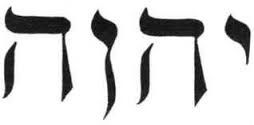SCRIPTURAE PRIMUM ET SOLUM
French: https://yomelijah.com/434579029/435879959
Spanish: https://yomeliah.com/435165580/435905661
Portuguese: https://yomelias.com/435876442/436040377
THE REVEALED NAME OF GOD
YHWH
"I will certainly magnify myself and sanctify myself and make myself known before the eyes of many nations; and they will have to know that I am Jehovah"
(Ezekiel 38:23)
There is no mystery, the Name of God, Jehovah (YHWH) is widely revealed by the fact that the letters of the Tetragrammaton (YHWH), are “Matres Lectionis”
According this text it is clear that God wants his Name, Jehovah (YHWH), to be known and revealed. Jesus Christ, the Son of Jehovah God, has made known the name of his Father: "Father, glorify your name.” Then a voice came out of heaven: “I have glorified it and will glorify it again" (John 12:28). "I have made your name known to them and will make it known, so that the love with which you loved me may be in them and I in union with them" (John 17:26). In the model prayer, the very first request made to God is about His Name: "Our Father in the heavens, let your name be sanctified" (Matthew 6:9). In this model prayer, the requests are , are by order of priority. We must consider the Divine Name, Jehovah, as sacred, and we must use it in our personal relationship with Him, but also in the ministry of the Word (Bible), the preaching the Good News, and in the biblical teaching (Matthew 24:14; 28:19,20).
Some people will say that Jesus Christ did not use the name of Jehovah as part of his teaching, nor even in his prayers, in the four gospels (Matthew, Mark, Luke and John). This does not mean that he did not pronounce the Divine Name. For example, when he went to the synagogue of Nazareth to tell that he had been anointed by his Father to perform his earthly ministry, it is written: "He then went to Nazʹa·reth, where he had been brought up, and according to his custom on the Sabbath day, he entered the synagogue and stood up to read. So the scroll of the prophet Isaiah was handed to him, and he opened the scroll and found the place where it was written: “Jehovah’s spirit is upon me, because he anointed me to declare good news to the poor. He sent me to proclaim liberty to the captives and a recovery of sight to the blind, to send the crushed ones away free, to preach Jehovah’s acceptable year.” With that he rolled up the scroll, handed it back to the attendant, and sat down; and the eyes of all in the synagogue were intently fixed on him. Then he began to say to them: “Today this scripture that you just heard is fulfilled" (Luke 4: 16-21). Jesus Christ read from Isaiah 61:1, with the Divine Name, Jehovah. That means that Jesus Christ did not hesitate to use the Divine Name, Jehovah, as part of a public Bible reading.
Pronounced as it is written
The Divine Name YHWH is pronounced as it is written
Y=i H= (expired silent h (e)) W=ou H (final)=a
YHW = IOUA matres lectionis Hebrew (vowel/consonant letters)
YHWH=IEOUA (Jehovah in English)
Some people think that the pronunciation of the Divine Name has been lost and that we are no longer able to use it with the exact vocalisation. In the prophecy of Ezekiel 38:23, it is written that Jehovah will make his Name known in the worldwide part of the earth, especially at the time of the great tribulation. Therefore, God has been taking care of his Name in order to keep it known, particularly in his Word, the Bible. Some historical and technical information, regarding the Divine Name, are based on a book entitled, "A History of the Divine Name" - (L'Harmattan (French edition)), written by Mister Gerard Gertoux, a Hebrew scholars. This information concerning the Divine Name is supported by several hundred references as historical sources. The introduction of this book, on pages 9 and 10 summarizes very well all of this historical research work concerning the Divine Name. There is no mystery:
"First of all, the writing of the name of God is not a problem: it is the name of four letters YHWH, called the Tetragrammaton. How to pronounce such a Name? The dictionaries or encyclopedias indicate that "Yahweh" is an uncertain vocalisation, and that "Jehovah" is a barbarism from misreading, unbelievable as it may seem, this last statement is deliberately false, but this gross error was denounced by Hebrew scolars of all religions, including the support of the Vatican (Congregation of Propaganda), but without result.
This name YHWH is read without difficulty because it is pronounced as it is written, or "according to its letters", to quote the expression of the Talmud. In fact, until 70 AD, the high priests read the blessing of Numbers 6:24-27, in the Atonement Day, the Yom Kippur by pronouncing the Name, YHWH, according to his letters, that is to say as it is written. In fact, this name is even the easiest to read of the entire Bible since it has four vowels, as Flavius Josephus wrote it. The question of knowing which vowels were used to read YHWH is absurd, because the Masoretic vowels did not appear until at least the sixth century AD. Before that, the Hebrew names were vocalized through the three letters Y, W, H, as the writings of Qumran (Dead Sea Scrolls) have largely confirmed. The letter Y was read I (or Ê), letter W: Û (or O) and the letter H: A at the end of the words. For example, YH is read IA. YHWDH is read literally IHUDA (Judah). If the name did not have any vowels, then the vowel "a" was inserted; thus YSHQ is read: ISaHaQ (Isaac), YRWSLYM: IRÛSaLIM (Jerusalem); etc. The name YHWH was read IHUA (Ioua). To better hear the letter H (almost inaudible), we could add a "e" mute. So the name YHWDH that can be read literally IH-Û-DA, becomes I-eH-Û-DA, the exact equivalent of the Hebrew name Yehuda . This slight improvement gives for the Name YHWH the pronunciation I-Eh-Û-A (Ieoua), the equivalent of the Masoretic punctuation YeHoWaH. This coincidence is remarkable and providential if one believes that God has watched over his Name (Visibly unbeknownst to the copyists)" ("History of the Divine Name" pages 9 and 10). We will have the opportunity to come back to other convergent information on the vocalisation of the Divine Name, Jehovah, by an examination of the Hebrew and Aramaic "theophoric" biblical names (with the tetragrammaton, partially (YH) or in its entirety (YHWH)).
"I Will Become What I Choose to Become"
(Exodus 3:14)
The answer often gives the meaning of the question or what it implicitly suggests. Regarding Jehovah's identity, Moses asks what he must say to his Israelite brothers:
"But Moses said to the true God: “Suppose I go to the Israelites and say to them, ‘The God of your forefathers has sent me to you,’ and they say to me, ‘What is his name?’ What should I say to them?”" (Exodus 3:13).
The question seems strange because it would suggest that the Israelites would have forgotten the proper Name of the God of their ancestors (Abraham, Isaac and Jacob), after 215 years in Egypt. But from the context of the book of Exodus, the Israelites feared and knew the name of Jehovah. For example, more than eighty years earlier, concerning the Hebrew midwives who refused to kill male newborns on the order of Pharaoh, the story adds that they feared Jehovah (Exodus 4:17). Moses himself knew Jehovah, the God of his ancestors (Hebrews 11:23-28). Therefore, the exact vocalisation was not a problem.
To understand, implicitly, the meaning of the two questions of Moses, it is necessary to examine the definition of the Hebrew word "shem" (שֵׁם), translated by "name": "a primitive word [perhaps rather from H7760 through the idea of definite and conspicuous position; compare H8064]; an appellation, as a mark or memorial of individuality; by implication honor, authority, character:— base, (in-) fame(-ous), named(-d), renown, report" (Strong's Corcondance (H8034)). Given Jehovah's response (from the biblical context), and the definition of "shem" (name), we understand that this is the name with its memorial of past actions that was to constitute his reputation:
"So God said to Moses: “I Will Become What I Choose to Become.” And he added: “This is what you are to say to the Israelites, ‘I Will Become has sent me to you.’” Then God said once more to Moses: “This is what you are to say to the Israelites, ‘Jehovah the God of your forefathers, the God of Abraham, the God of Isaac, and the God of Jacob, has sent me to you.’ This is my name forever, and this is how I am to be remembered from generation to generation" (Exodus 3:14,15).
The last part of Jehovah's answer makes it possible to understand the implication of the question of Moses: "I am to be remembered from generation to generation". The question "what is your name?" Should be understood in the following manner, "What is your "name", the "memorial" of its past actions connected to your name". And his answer, "I Will Become What I Choose to Become" is to be put in perspective to the idea that the Israelites and probably Moses, had regarding the name of the gods: To each god his name, connected with his miraculous power. The "I Will Become What I Choose to Become", also implies, that Moses wanted to know what to say about the miraculous power attached to Jehovah's Name.
Thus, when Jehovah God speaks of his Name as a "Memorial", it means that the question of Moses concerning the Name was: What will I say to the Israelites concerning the power of your Name and the extraordinary actions attached to this Name (As Memorial of past actions)? The question of Moses, regarding the Divine Name is inscribed on the capacity of action of the True God, who resides in the power of his Name. Nevertheless, Jehovah's response is very subtle: In Egypt, every god had a name attached to a very precise miraculous power of action. Thus, in his answer, "I Will Become What I Choose to Become", Jehovah does not want human intelligence to lock his Name only in one miraculous ability. In the account of Exodus 4:1-9, it is written that Jehovah did four miracles, showing his capacity for creation by turning the staff of Moses into a serpent, and making it become a staff. Also, by making the hand of Moses to have leprosy (destruction) and after, healing it (recreation). Through these two series of two miracles, Jehovah God illustrated his all mightiness, and therefore only his extraordinary actions would reveal the memorial of his name. "I Will Become What I Choose to Become", it is the action undertaken by God that would give the spiritual meaning to his Name, of Who "He is".
From the scientific etymology of a name to its spiritual meaning
In the Bible, a Hebrew or Aramaic name has an intrinsic etymological meaning that anyone understanding these languages can understand. However, to this scientific etymology is added a biblical spiritual significance (or message), that explains the meaning of this name, its authority, its mission. Take several known examples:
- Jesus: Scientific etymology: Yeshua or Yehoshua in Hebrew means "Jehovah is salvation". The message or spiritual meaning of his name: "he will save his people from their sins" (Matthew 1:21).
- Noah: Scientific etymology: Rest. The spiritual meaning of his name: consolation: "This one will bring us comfort from our labor and from the painful toil of our hands because of the ground that Jehovah has cursed" (Genesis 5:29).
- Israel: Scientific etymology: Struggle with God. The Spiritual Meaning of His Name: Fight and persevere with God and with men: "you have contended with God and with men and you have at last prevailed" (Genesis 32:28).
- Barnabas (name of Aramaic origin): Scientific etymology: Son of prophecy. The spiritual meaning of his name: Son of consolation: "So Joseph, who was also called by the apostles Barʹna·bas (which means, when translated, “Son of Comfort”)" (Acts 4:36).
Here is the explanation found in "A History of the Divine Name" (page 41), regarding the discrepancies between the scientific etymology of a name and its spiritual meaning or biblical message:
"We can note the "chasm" separating these two kinds of etymologies: Rather than trying to make them coincide, we must remember that the explanation of these differences is always the same: the purpose of the Biblical definitions is to give above all, a religious message. Besides, what would be the point of explaining to a Hebrew the meaning of a Hebrew name? Thus, it is obvious to a Hebrew that the name Noah scientifically means "rest"; however the verse of Genesis 5:29 tells us that this "rest" will biblically mean "he will comfort", because Noah was going to play a consoling prophetic role ".
Some people think that Jehovah's statement concerning his Name, "I Will Become What I Choose to Become", is to be considered as a scientific etymology of the Name, allowing at the same time a more exact vocalization of it (Exodus 3:14). This interpretation has two major obstacles:
1 - The Name itself, Jehovah (YHWH), has no proven Hebrew scientific etymology. What seems logical: To say that the proper Name Jehovah, would have a scientific etymology would be an anachronism that would suggest that the Hebrew language would have preceded the existence of the Divine Name. Now this Name is closely associated with an everlasting God who had no beginning (Genesis 1: 1)... Moreover, according to the inspired statements of the Apostle Paul, it does not seem that in the heavens one speaks Hebrew (1 Corinthians 13: 1 "tongues of angels"). It is more logical to think that the Hebrew language would be built around the Name, even allowing the children to vocalize it in all simplicity (It is pronounced according to its letters to use the expression of the Talmud, consisting of the three consonants/vowels of base for reading (YHW) (Matres Lecionis)): ""Do you hear what these are saying?” Jesus said to them: “Yes. Did you never read this, ‘Out of the mouth of children and infants, you have brought forth praise’?"" (Matthew 21:16 compare with 11:25).
2 - The context of the book of Exodus shows that the Israelites knew the name of the God of their ancestors (Abraham, Isaac and Jacob), and therefore its vocalisation was known. The answer of God "I Will Become What I Choose to Become", is not a scientific etymology of his Name (which would have helped Moses to better vocalize the Name), but rather a spiritual message regarding the "Memorial" of his Name (Exodus 3:15).
There are four main methods of finding the vocalisation of the Name, and the vocalisation of Biblical names
1 - The method of etymology: the name is identified with its etymology (when it exists). It is the most uncertain method because it considers that the etymology is systematically scientific and equivalent to the spiritual etymology or spiritual message (which is not always the case (see explanations above)) .
2 - The method of reading letters which demonstrates that the Name (YHWH) can be read by itself. It consists of the three basic letters (consonants/vowels (YHW) (Matres Lectionis)), allowing its reading (The letter Y is read I (or Ê), letter W: Û (or O) and the letter H: A to the end of the words)) (See explanations above).
3 - The method of the witnesses: It consists of examining the vowels used for the Hebrew names translated into Greek, in the text of the Septuagint (The Bible translated from Hebrew to Greek (2nd century BC)). For example: Abraham is written in the Septuagint, Abraam. Jesus: Iesous. Noah: Noé. Israel: Israel. Judah: Iouda. Moses: Môusès. Jerusalem: Iérousalèm.
4 - The onomastic method is the study of the Hebrew names which contain the Tetragrammaton (YHWH), or partially (YH). Names with the Tetragrammaton (wholly or partially), are "theophoric" names. This is the most reliable method: "This last method is the most reliable because the names are very stable over time, often much more than the words of the language themselves. The biblical names are somehow a memory sounds of the past or "phonograms". In addition, the Hebrew language was, despite some variations, very stable over a long period of time, for example, the Hebrew letters of El Amarna dating from the 14th century BC can still be understood by a modern Israeli. So one can reconstruct a name with a very high confidence rate if the name to be found is preserved in several other names, and in this respect the divine name is extremely favored, since it was integrated into hundreds of biblical names, the only difficulty being to avoid confusing the great name YHWH (Jeremiah 44: 26) with the little YH (Psalms 68: 4)" (A history of the Name page 45) ( YHWH: Jehovah, YH: Yah (diminutive of the Name).
Conclusion on the vocalisation of the divine Name
"Outside the Masoretic vocalisation, there are several methods of finding the pronunciation of a name in the first century AD. However, biblical etymology (which is actually religious teaching), can not be used for this purpose.In the case of the Tetragrammaton, these three methods successively give the three pronunciations, Iaô (Witnesses method: comparison with the names of the Septuagint), Yehowah (onomastic method: comparison with theophoric names), Ihûa (method of reading letters), The examination of the historical context has made it possible to explain the discrepancy in Iaô, because at that time the Hebrew substitute YHW, or his Aramaic counterpart YW, was still widely used among the Jews. (...) Thus, there is a good agreement between the two pronunciations Yehowah and Ihûa, as satisfactory as * Yehudah and Ihuda (Judah), * Yésûa’ et Isûa’ (Jésus), etc. In view of this concordance, ** unanimity on vocalisation should have been easy to obtain!" (A History of the Name page 54).
* The peculiarity of these two theophoric names is that they contain the entire tetragrammaton (YHWH). That's why they are taken as examples of proven vocalisations. Therefore, their respective vocalisation makes it possible to know automatically how the Name was pronounced: Yehudah and Ihuda (Judah), Yésûa’ et Isûa’ (Jésus): YHWH = Iuah or Ieouah.
** The conclusion of this book "A HISTORY OF THE DIVINE NAME", confirms a vocalisation of the Name (Ioua), discovered hundreds of years ago by the Spanish monk Raymond Martin in his book (Pujio fidei (Dagger of the faith (1278))). He himself had drawn his sources on the writings of R. Moseh Ben Maymon (Maimonides), in "The Guide of the Lost" chapters 60-64, Part 1, relating to the Name. Another scholar named Porchetus de Salvaticis (1303), like Raymond Martin, used the same vocalisation of the Name.
"And everyone who calls on the name of Jehovah will be saved"
(Joel 2: 32)
"At that time those in fear of Jehovah spoke with one another, each one with his companion, and Jehovah kept paying attention and listening. And a book of remembrance began to be written up before him for those in fear of Jehovah and for those thinking upon his name" (Malachi 3:16)
Our relationship with Jehovah is spiritual (not magical): "However, there is a difference in size between the Hebrews and other peoples regarding the conception of the name of a divinity: In the peoples of antiquity, invoking the name of the God forces him to act, it is a magical conception of the name, whereas among the Hebrews the invocation of the name of God is only a supplication and not an incantation (1 Kings 8:33,34). For example, in his dialogue with Jesus, Satan quoted Psalm 91:11,12 in the sense of an obligation to God, the magical conception of prayer (analogous to the lamp of Aladdin). Jesus corrected this erroneous conception (Matthew 4: 6,7)" ("A History of the Divine Name "(page 57)).
The Bible shows that a magical conception of the Name is spiritually dangerous. Shortly before his ascension to heaven, Jesus Christ had said that his Father had transferred to him all the authority in connection to his Name: "All authority has been given me in heaven and on the earth" (Matthew 28:18). Therefore, all Christians who sought (and even now) the help of God, should do so in the name of Christ. However, what is applicable to the Divine Name, Jehovah, also applies to the Name of Christ, Jesus (Yehoshouah): do not use it magically, wanting to force God to act (by vocalising His Name magically). Here is what happened on one occasion, written in the book of Acts (Bible):
"But some of the Jews who traveled around casting out demons also tried to use the name of the Lord Jesus over those who had wicked spirits; they would say: “I solemnly charge you by Jesus whom Paul preaches.” Now there were seven sons of a Jewish chief priest named Sceʹva doing this. But in answer the wicked spirit said to them: “I know Jesus and I am acquainted with Paul; but who are you?” At that the man with the wicked spirit leaped on them, overpowered them one after the other, and prevailed against them, so that they fled naked and wounded out of that house. This became known to all, both the Jews and the Greeks who lived in Ephʹe·sus; and fear fell upon them all, and the name of the Lord Jesus went on being magnified" (Acts 19:13-17). It is obvious that these Jews, who were doing the job of driving out demons, using the name of Jesus in a magical way, without having faith in him, were punished.
To invoke the name of Jehovah means that we must love Him (Matthew 22: 37-40), to have faith in Him, and in His Son Jesus Christ (John 3:16,36; 17: 3; Hebrews 11: 6). To invoke the Name of Jehovah through His Son Jesus Christ will enable us to survive the great tribulation and obtain the everlasting life: "This means everlasting life, their coming to know you, the only true God, and the one whom you sent, Jesus Christ" (John 17:3, Revelation 7: 9-17).
Share this page






